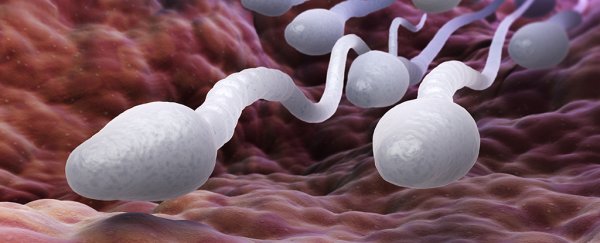If you're a sperm-producer who doesn't want kids, your personal contribution to contraception is currently limited to condoms or the snip.
Needless to say, not everybody likes those choices. But now a topical treatment could add another simple, non-invasive option to the mix - it's a hormonal gel that reduces sperm count when applied to the skin.
Next April, researchers at the National Institute of Child Health and Human Development are expecting to begin clinical trials on this gel, which has been in development for several years.
In 2012 the team conducted a trial on a combination of two gels that successfully saw the number of sperm in their semen drop to less than 1 million per millilitre – a concentration that's far enough below the normal 15 to 200 million sperm per millilitre to actually hamper fertility.
Applying two gels (it had to be done on two different body parts, too) would be quite a hassle though, so now researchers have finally combined the treatment into one easy-to-use application.
The gel is a combination of synthetic versions of the hormones progesterone and testosterone.
The progesterone analogue, called nestorone, competes with the body's testosterone levels, reducing them in the testes just enough to prevent mature sperm from being made. The added boost of testosterone helps keep hormones balanced throughout the rest of the body.
By rubbing half a teaspoon of the quick-drying liquid each day onto a body part, such as the upper arms or shoulders (away from the family jewels is probably best), sperm levels will be kept down for the next couple of days.
The study will take in a few hundred partnered test subjects scattered over the US, Chile, Europe, and Kenya, who are expected to use the treatment over four months while their sperm levels are monitored.
Once they get the thumbs up, the couples are invited to go off all other forms of birth control, meaning for the next year the only thing between the test subjects and parenthood is the gel.
"I am very confident that if men put the gel on every day and apply it correctly, it will be effective," Stephanie Page, principle investigator and a professor of medicine at the University of Washington told Emily Mullin at MIT Technology Review.
Another trial is currently underway to ensure any stray gel rubbing onto a partner isn't cause for alarm.
Male contraceptives have been on the horizon for a while now. But while a number of progressive men are keen to carry their share of responsibility, fanfare isn't as loud as we might expect and not all pharmaceutical companies are clamouring for a piece of the pie.
For one thing, a number of the treatments currently in the pipeline include injections of one sort or another. On paper, that shouldn't scare your average fully grown male, but in reality it may not have everybody rushing out for a shot.
Another hurdle could simply be that a number of men just don't care when it comes to birth control. Or don't make the connection between female contraception and not having a baby.
With potential roadblocks like these in the way, anything that makes the process of male contraception as simple and foolproof as possible is a worthy goal.
Given the nature of clinical trials, even with a best case scenario we shouldn't expect this gel to be available on the market just yet.
But if this treatment passes with flying colours and makes it through red tape and regulations, it would be a great addition to our currently limited contraception choices.
